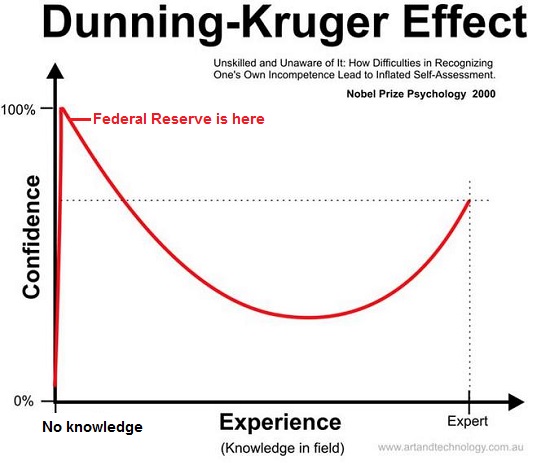A Shocking Admission: “The Federal Reserve is a Criminal Conspiracy”
Charles Hugh Smith
 A spokesperson assured the assembled media that the Fed Board was “deeply concerned” about the American people, inflation, and the unemployment rate, but he was heckled off the stage. A spokesperson assured the assembled media that the Fed Board was “deeply concerned” about the American people, inflation, and the unemployment rate, but he was heckled off the stage.
In an extraordinary admission, the Board of Governors of the Federal Reserve conceded that the Federal Reserve is “at heart a criminal conspiracy of bankers.” The Board followed up this revelation with a breezy confession that the Fed “doesn’t really give a rat’s rear-end about the American people, and we’re tired of having to claim we do.”
The Fed’s role was global, the Board explained; the American people played no part whatsoever in Fed policy or decisions. “Honestly, why would anyone think we waste a moment’s thought on the American people?” one commented. “We’re here to maintain the power and wealth of the banking sector on a global scale. We have zero interest in John Q. Citizen’s travails or his income. Our only interest in Mr. Citizen is that he continue to keep his mouth shut and not make waves.”
The unprecedented display of bare-knuckled honesty was in evidence throughout the meeting. Asked if the Fed was confident that its policies were appropriate for the nation, one board member snapped, “We don’t really think about the nation, but yes, we are 99% confident that our policies are appropriate and correct. In fact, let’s dispense with the false modesty: we’re 100% confident we are correct.”
When a reporter asked if the Board was familiar with the Dunning–Kruger effect, a Board member snapped, “We don’t concern ourselves with rare neurological diseases, or whatever that is. We govern the markets and the global economy.”

The Dunning–Kruger effect is a cognitive bias wherein unskilled individuals suffer from illusory superiority, mistakenly assessing their ability to be much higher than is accurate.
“If you’re incompetent, you can’t know you’re incompetent. […] the skills you need to produce a right answer are exactly the skills you need to recognize what a right answer is.” David Dunning
Rumors quickly spread that the Fed’s water supply had been spiked with Ibogaine, which could explain the extraordinary public outburst of truthfulness. As handlers moved in to escort the Board members to their private chambers, some of the Board responded testily. One was heard to mutter, “Keep your grubby little paws off me, peon!”
A spokesperson assured the assembled media that the Fed Board was “deeply concerned” about the American people, inflation, and the unemployment rate, but he was heckled off the stage.

At readers' request, I've prepared a biography. I am not confident this is the right length or has the desired information; the whole project veers uncomfortably close to PR. On the other hand, who wants to read a boring bio? I am reminded of the "Peanuts" comic character Lucy, who once issued this terse biographical summary: "A man was born, he lived, he died." All undoubtedly true, but somewhat lacking in narrative.
I was raised in southern California as a rootless cosmopolitan: born in Santa Monica, and then towed by an upwardly mobile family to Van Nuys, Tarzana, Los Feliz and San Marino, where the penultimate conclusion of upward mobility, divorce and a shattered family, sent us to Big Bear Lake in the San Bernadino mountains.
The next iteration of family took us to the island of Lanai in Hawaii, where I was honored to join the outstanding basketball team (as benchwarmer), and where we rode the only Matchless 350 cc motorcycle on the island, and most likely in the state, through the red-dirt pineapple fields to the splendidly isolated rocky coastline. In 1969-70, this was the old planation Hawaii, where we picked pine in summer beneath a sweltering sun.
We next moved to Honolulu, where I graduated from Punahou School and earned a degree in Comparative Philosophy (i.e. East and West) at the University of Hawaii-Manoa. The family moved back to California and I stayed on, working my way through college apprenticing in the building/remodeling trades.
I was quite active in the American Friends Service Committee (Quakers) and the People's Party of Hawaii in this era (1970s).
I next moved to the Big Island of Hawaii, where my partner and I built over fifty custom homes and a 43-unit subdivision, as well as several commercial projects.
Nearly going broke was all well and good, but I was driven to pursue my dream-career as a writer, so we moved to the San Francisco Bay Area in 1987 where I worked in non-profit education while writing free-lance journalism articles on housing, design and urban planning.
Within a few years I returned to self-employment, a genteel poverty interrupted by an 18-month gig re-organizing the back office of a quantitative stock market analyst. I learned how to lose money in the market with efficiency and aplomb, lessons I continue to practice when the temptation to battle the Monster Id strikes.
Somewhere in here my first novel was published by The Permanent Press, but alas it fell still-born from the press--a now monotonous result of writing fiction. (Seven novels and I still can't stop myself.)
I started the Of Two Minds blog in May 2005 as a side project of self-expression, and in an unpredictable twist of evolutionary incaution, that project has ballooned into a website with about 3,500 pages that has drawn almost 20 million page views.
The site's primary asset may well be the extensive global network of friends and correspondents I draw upon for intelligence and analysis.
The blog is #7 in CNBC's top alternative financial sites, and is republished on numerous popular sites such as Zero Hedge, Financial Sense, and David Stockman’s Contra Corner. I am frequently interviewed by alternative media personalities such as Max Keiser, and am a contributing writer on peakprosperity.com.
www.oftwominds.com
|




